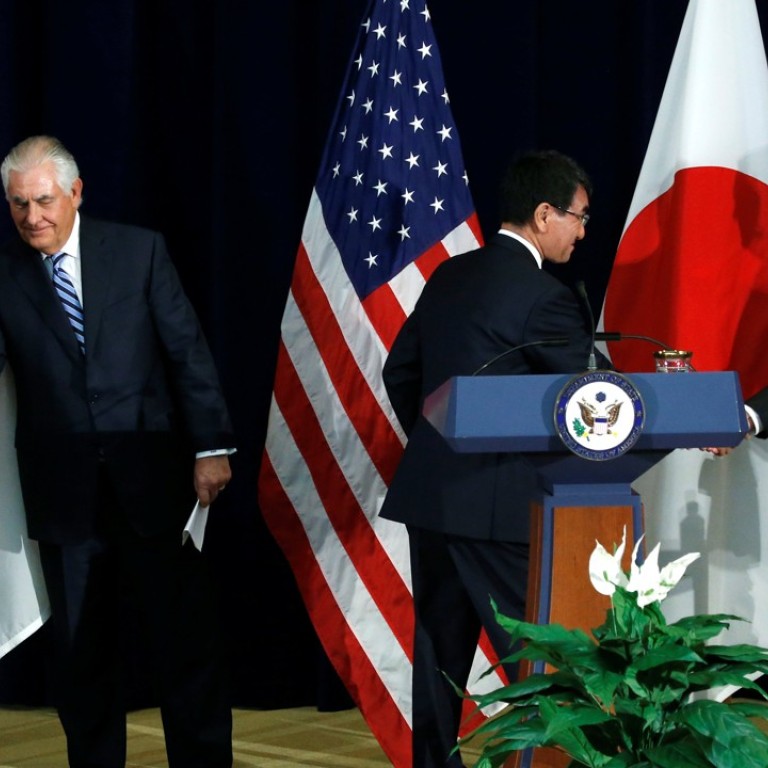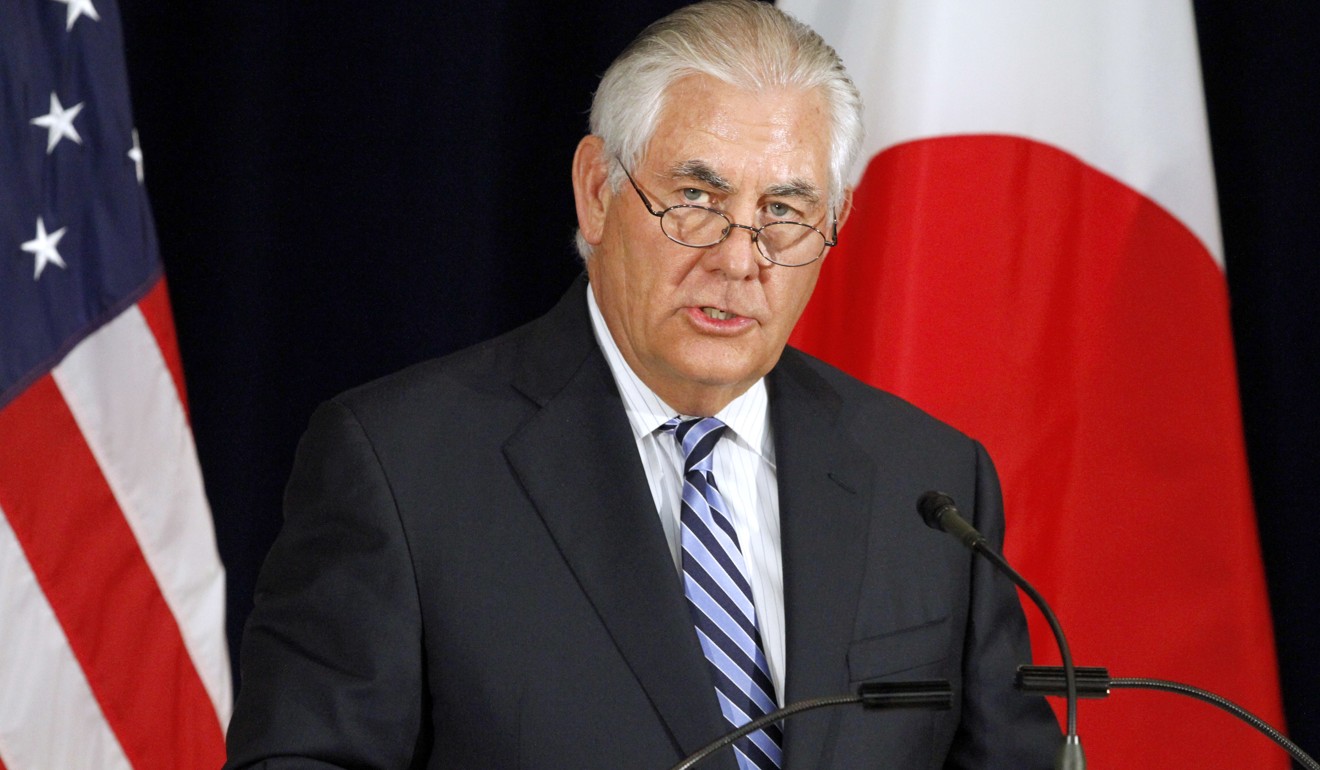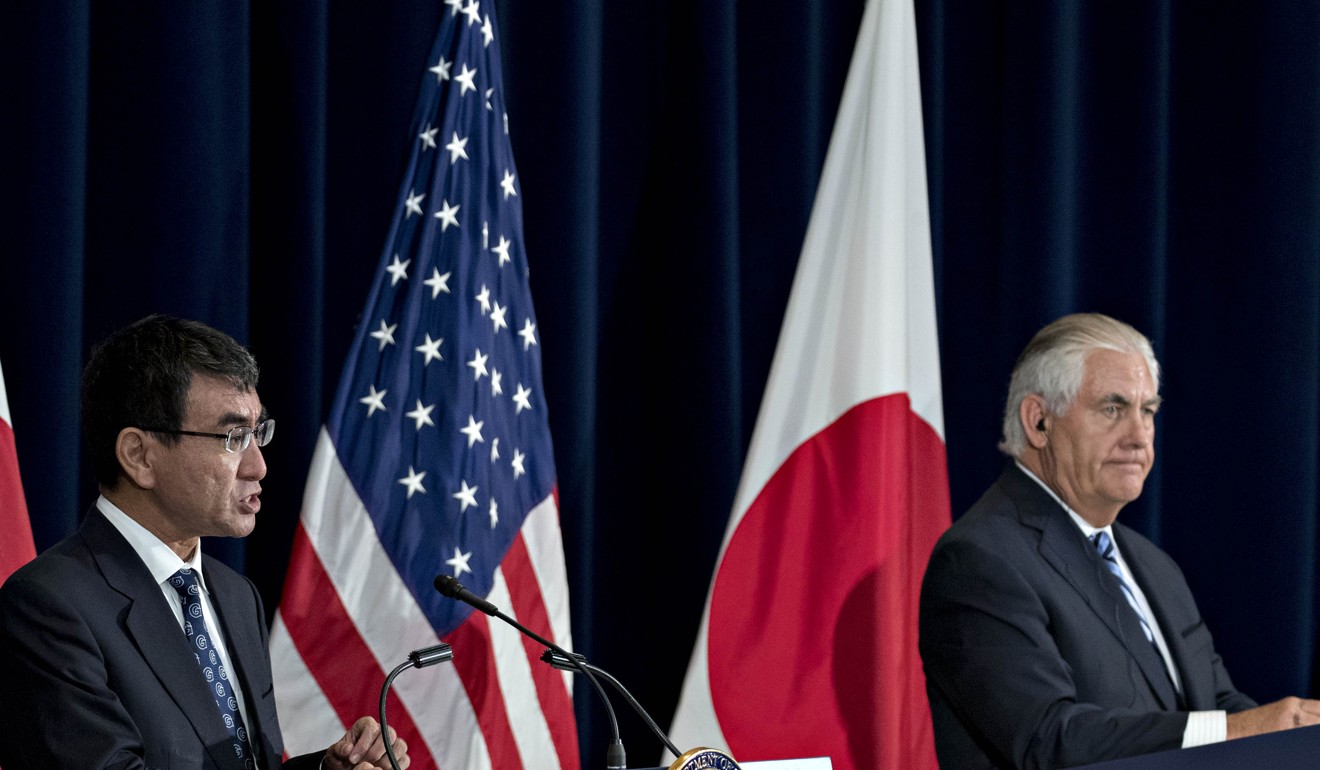
US and Japan bolster alliance and vow to pressure North Korea
Japan and the United States on Thursday pledged to continue applying pressure on North Korea while ensuring a firmer bilateral alliance to better respond to the increased threat posed by Pyongyang’s nuclear and missile programmes.
The two countries’ foreign and defence ministers called on the international community to “comprehensively and thoroughly implement” UN Security Council sanctions on North Korea so as to compel it to change course, they said in a joint statement issued after a meeting in Washington.
The ministers singled out China as needing to take “decisive measures” in regards North Korea, prodding Beijing to tighten the economic screws on Pyongyang. China accounts for about 90 per cent of the North’s trade and is a major supplier of oil to the country.
Referring to trilateral security cooperation with South Korea, they stressed the need to enhance information-sharing and expand three-way exercises including missile warning, anti-submarine warfare and maritime interdiction operations, the statement said.

Bringing together Japanese Foreign Minister Taro Kono, Defence Minister Itsunori Onodera, US Secretary of State Rex Tillerson and Defence Secretary Jim Mattis, it marked the first meeting of the Japan-US Security Consultative Committee, known as the “two-plus-two,” since US President Donald Trump took office in January.
Faced with progress in North Korea’s nuclear weapons and ballistic missile technology, the ministers reaffirmed the alliance’s commitment to the security of Japan through the full range of capabilities, including US nuclear forces.
North Korea test-launched two intercontinental ballistic missiles last month and the US Defence Intelligence Agency reportedly assessed that Pyongyang could ready a reliable nuclear-capable ICBM as early as next year, two years earlier than previously estimated.
Last week, North Korean leader Kim Jong-un threatened to simultaneously fire four ballistic missiles into waters off the US Pacific territory of Guam. The flight path suggested by the North would take the missiles over Shimane, Hiroshima, Ehime and Kochi prefectures in western Japan.
“The ministers committed to bolster the capabilities of the alliance to deter and respond to these threats,” the statement said.
“They also concurred on continuing to pressure North Korea, in cooperation with other countries, to compel it to take concrete actions to end its nuclear and ballistic missile programmes, and to achieve the complete, verifiable, and irreversible denuclearisation of the Korean Peninsula,” it said.
Referring to China’s attempts to challenge Japan’s administration of the Senkaku Islands, the ministers reconfirmed Article 5 of the Japan-US security treaty applies to the East China Sea islets, meaning that Washington will defend Tokyo in the event of conflict over the islands.
“The United States and Japan oppose any unilateral action that seeks to undermine Japan’s administration of these islands,” the statement said, alluding to repeated intrusion by Chinese government vessels into surrounding Japanese waters.
The ministers expressed veiled criticism of China’s militarisation of outposts in disputed areas of the South China Sea, saying they “reaffirmed their opposition to unilateral coercive actions by claimants ... that alter the status quo and increase tensions.”
China has overlapping territorial claims with Brunei, Malaysia, the Philippines, Vietnam and Taiwan in the South China Sea. Beijing has refused to comply with last year’s international tribunal ruling that invalidated the country’s claims across almost the entire sea.
The ministers affirmed the two countries’ intention to further promote defence equipment and technology transfers to Southeast Asian nations such as the Philippines and Vietnam in maritime security and other areas.
They vowed to advance trilateral and multilateral security cooperation with other partners in the Asia-Pacific region, notably South Korea, Australia, India and Southeast Asian countries, with the US committing to maintain a strong presence in the region.

On the Japan-US plan to move US Marine Corps Air Station Futenma within Okinawa Prefecture, southern Japan, the ministers underscored that the current plan is “the only solution” for removing the dangers posed by the air station without undermining the deterrence provided by the Japan-US alliance.
“The ministers reaffirmed the two governments’ unwavering commitment to the plan and underscored their strong determination to achieve its completion as soon as possible and the long-desired return of MCAS Futenma to Japan,” the statement said.
Okinawa Governor Takeshi Onaga has demanded that the Futenma base be moved outside the prefecture. Many Okinawa residents said they want to reduce the burden on the prefecture from hosting the bulk of US forces in Japan.

